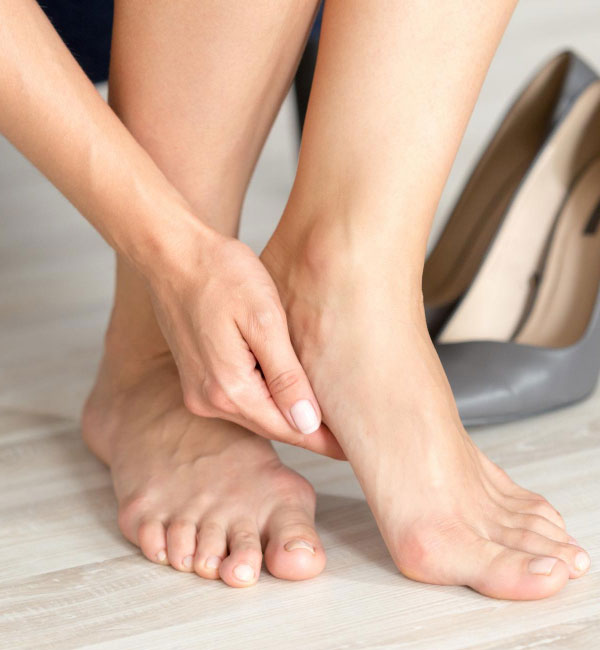Overview
Plantar fasciitis, which causes heel pain, is a condition/disorder in which the plantar fascia—a strong band/strip of tissue connecting the heel bone to the toes and supporting the foot arch—becomes uncomfortable or inflamed.
This condition is common among those who spend many hours on their feet, wear unsupportive shoes, or otherwise engage in activities that place additional stress on them. Plantar fasciitis can also be defined as the leading cause of heel pain in adults. However, it does not exclusively affect them.
Causes of Heel Pain
- Overuse & Stress: Long hours of standing, walking, or running.
- Footwear Issues: Shoes with poor arch support or thin soles.
- Foot Structure: Flat feet, high arches, or abnormal gait.
- Color is an Age Factor: More common in ages 40–60.
- Obesity: Increases the amount of stress on the plantar fascia as weight increases.
- Occupational Risks: Prolonged standing (e.g., teachers, factory workers).
- Sudden Increase in Activity: Suddenly doing intensive workouts.
Of course, there are other causes of heel pain, such as Achilles tendonitis, heel spurs, stress fractures, arthritis, or nerve compression. However, plantar fasciitis is still the most commonly diagnosed.
Symptoms of Heel Pain (Plantar Fasciitis)
- Sharp stabbing pain, particularly in the morning.
- Pain after an extended sit or rest.
- Tenderness at the bottom of the heel.
- Some swelling or stiffness may occur in more severe situations.
- Walking barefoot or going up stairs becomes very painful sometimes.
Untreated heel pain often results in compensatory problems such as knee, hip, or back pain since the walking patterns have been altered.
Diagnosis of Heel Pain
Dr Ekta's Pain Management Clinic thus undergoes a holistic route: -
- Medical Records/History: It provides a picture of lifestyle, footwear, activity levels, and when the pain started.
- Physical Examination: Evaluating the condition of the foot, arch support, and tenderness at the heel.
- X-Rays: To rule out fractures and heel spurs.
- Ultrasound: Assessment of the plantar fascia for thickness and inflammation.
- MRI is very rare but crucial in chronic cases with suspected damage to soft tissue. Immediate and precise diagnosis stops the condition's advancement and provides a correct treatment plan.
Why We Are Different

No
Surgery

30-Minute Procedure

Targets Root Cause

Minimal Downtime

Long-Lasting Results

Proven, Safe Methods
Treatment Options at Dr Ekta's Pain Management Clinic
Our focus is on non-surgical and minimally invasive therapies for pain reduction, mobility improvement, and recurrence prevention.
Medications
- NSAIDs, Nonsteroidal Anti-Inflammatory Drugs, for pain and swelling.
- Pain control by topical gels or patch products.
Interventional Pain Procedures
- Steroid Injections: Quickly reduce awful inflammation.
- Platelet-Rich Plasma (PRP) Therapy: Exploiting one's blood growth factors for fascia repair.
- Shockwave Therapy: Stimulating healing in chronic plantar fasciitis.
- RFA or Radiofrequency Ablation: It provides lifelong comfort by modulating nerve signals.
- BMAC or Stem Cell Therapy: Propagates tissue regeneration in rare cases.
Exercises and Rehabilitation
- Stretching exercises for the Achilles tendon & plantar fascia.
- Specific exercises aim to strengthen the foot and calf muscles, reducing strain.
- Night splints are used to keep the fascia stretched overnight.
- Ultrasound therapy and cold therapy to control inflammation.
Supportive Prosthetics
- Custom orthotic insoles.
- Heel cups or pads distribute pressure.
- Comfortable and balanced supportive footwear.
Prevention and Lifestyle Care
- Weight control is essential because excess weight adds stress to the feet.
- Ergonomic advice related to work strains.
- Return-to-exercise programs that ensure athletes do not re-injure themselves.
Self-Care & Prevention Tips
- Supportive shoes should be used, without walking barefoot on hard ground.
- Daily stretch of feet and calves.
- With a very long period of activity, ice the heel.
- Heels with no shoe support could be cured with over-the-counter heel cushions.
- Keep from making sudden increases in intensity for exercises.
- Remain physically fit.
FAQs (Plantar Fasciitis)
How long will plantar fasciitis take to heal?
With appropriate treatment, many but not all chronic cases would get better after 6-12 weeks.
Do heel spurs cause pain in the heel?
Not necessarily. Most people with heel spurs never experience symptoms; what causes the pain is often inflammation of the plantar fascia.
Does plantar fasciitis heal by itself?
They could try low-impact exercises like walking, yoga, and swimming to lessen stiffness and pain.
Are these injections safe for heel pain?
Yes, these injections, such as corticosteroid or PRP injections, are safe and effective when provided by well-experienced specialists.
Should I avoid exercising in the case of plantar fasciitis?
Yes, but low-impact exercises such as swimming or cycling are the best alternatives and usually acceptable to your condition until the symptoms improve.
Why Dr Ekta's Pain Management Clinic for Heel Pain?
- Specialized Expertise in Diagnosis and Treatment of Plantar Fasciitis and Heel Problems.
- Advanced Non-Surgical Therapies such as PRP, RFA, and shock wave therapy. Custom Rehabilitation Plans include physiotherapy, orthotics, and injections.
- A holistic approach focusing on the long-term health of the feet, not just pain relief.
- Patient-centered care ensures comfort, recovery, and recurrence prevention.
According to Dr Ekta's Pain Management Clinic, heel pain should never come between you and your life. Our personalized care and cutting-edge treatments will help you walk, work, and move freely again—without surgery.
Why Choose Us
We’re the most trusted Pain Specialists in West Delhi.
Our expert clinical approach and treatment framework extends beyond just ordinary pain-relief practices to precise and targeted comprehensive pain treatment and management that ensures faster recovery and quicker return to an active life.
With robust expertise in advanced non-surgical Heel Pain (Plantar Fasciitis) Treatment in West Delhi, our Pain Specialists at Dr Ekta’s Pain Management Clinic, strives to ensure the best of care for lasting pain relief and comfort.
Here’s why we’re the best at what we do:
- Expertise
- Compassionate Care
- Advanced Techniques
- Personalized Treatment Plans
- Commitment to Quality
- Transparent
 info@drektapainmanagement.com
info@drektapainmanagement.com +91-9560852171
+91-9560852171 E 29/b, Rajouri Garden, New Delhi, 110027
E 29/b, Rajouri Garden, New Delhi, 110027
